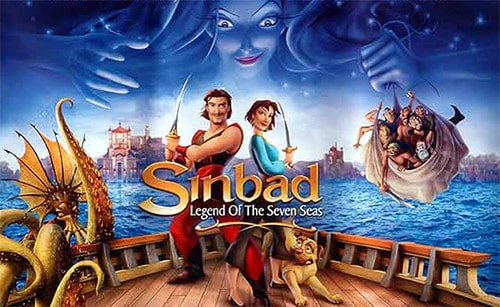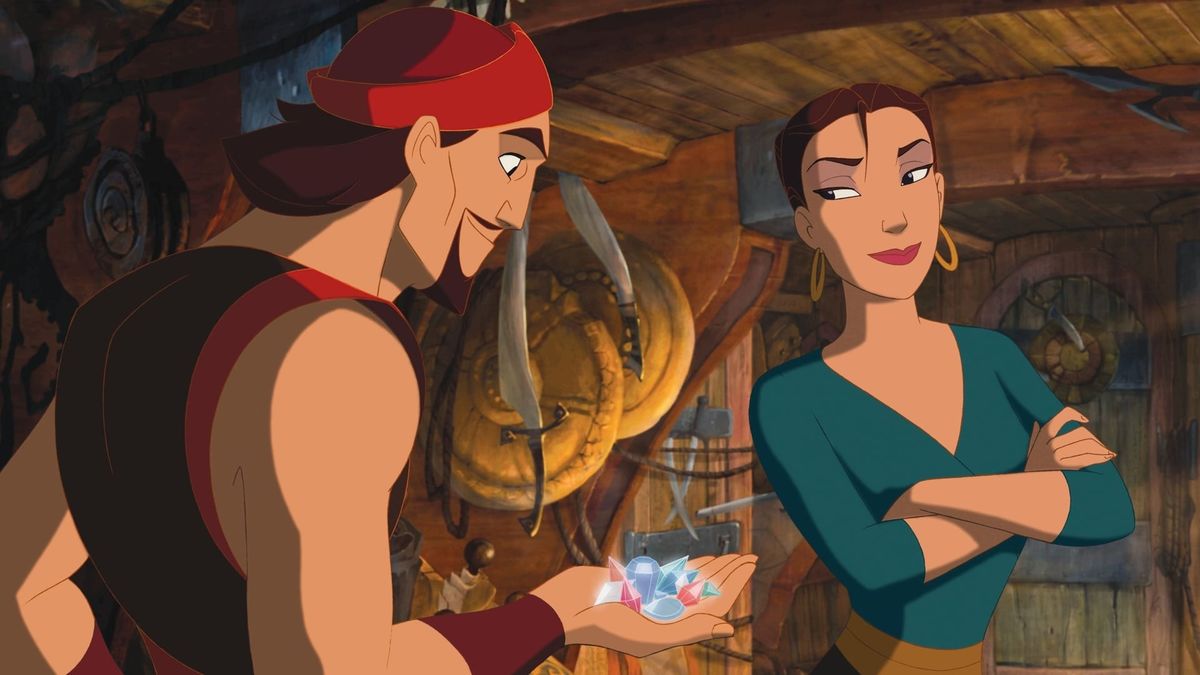With titles being produced by DreamWorks Animation becoming very much hit and miss when it came to box office results Jeffrey Katzenberg approached Gladiator screenwriter John Logan to pen a script for an animated Sinbad film in the hopes of creating their own Aladdin money-making machine to compete with Disney, sadly, this was not to be the case and Sinbad: Legend of the Seven Seas was not only a box office bomb it also resulted in the ending of traditional hand-drawn animation at DreamWorks Animation but what exactly went wrong?
The first stories of Sinbad the Sailor appeared in later editions of One Thousand and One Nights, which was a collection of Middle Eastern folk tales compiled in Arabic during the Islamic Golden Age, and with these, they brought to the world the fantastical stories of this fabled sailor, who often found himself a castaway on exotic islands full of magical beasts – which does call his credibility as a sailor into question – but such amazing tales were perfect fodder for Hollywood and though early versions were less than faithful to these classic tales we did eventually get some great Sinbad movies that were produced by Charles H. Schneer and legendary stop motion animator Ray Harryhausen, but aside from a few Popeye cartoons and a couple of straight-to-video movies tales of Sinbad didn’t get much traction in the world of hand drawn animation, which is odd considering the subject matter and ease of creating magical worlds through the art of animation seems a natural fit, but in 2003 Jeffrey Katzenberg released onto the world his $60 million dollar animated film Sinbad: Legend of the Seven Seas, the only problem here is that it wasn’t much of a Sinbad movie.
“Hello, I’m Sinbad the pirate, may I take your order?”
The movie opens with Sinbad (Brad Pitt) and his pirate crew attempting to steal the magical "Book of Peace" so they could hold it for ransom and retire to Fiji, which one must assume is a place all pirates dream of, but right off the bat I was left questioning “Since when has Sinbad been a pirate?” The classic stories of Sinbad depict him as an adventurer who sought his fortune on the Seven Seas but none of those classic tales ever mentioned him pirating. Was cinematic career shift an attempt to compete with Disney’s live-action Pirates of the Caribbean movie? Who knows, but this change drastically alters the very fabricate of the character and would it take a deft hand to make a nautical thief and murderer into a hero, sadly, screenwriter John Logan displays no such skill here. The film hints of a backstory where he had to fight to survive on the streets as an orphan, where one assumes he was “One jump ahead of the breadline. One swing ahead of the sword” but we never really find out much about this other than that this was where he crossed paths with Prince Proteus of Syracuse (Joseph Fiennes), but where they were once childhood friends they now find themselves on opposite sides of the law.
Sinbad and Proteus in the Battle of the Blands.
Turns out that Proteus is on board the ship Sinbad and crew were trying to rob during the opening action sequence, and it was Proteus’s father who gave him the mission to bring the “Book of Peace” to Syracuse, which would somehow secure world peace or something – basically the “Book of Peace” is a ridiculous McGuffin that literally makes no sense – and despite Proteus calling upon their heartfelt history Sinbad still intends to steal the book. A guy has got to get paid. Lucky for our two stalwart sailors they aren’t forced to kill each other as their duel is interrupted by the appearance of a sea monster sent by Eris, Goddess of Discord (Michelle Pfeiffer), who wants to steal the book and thus throw the world into chaos, which brings up a rather big sticking point for me, “Why is a Greek goddess messing with Sinbad?” In fact, the sea monsters she sends after the book is the fabled Cetus, the creature that Perseus slew to save Andromeda, and then later in film Sinbad and company will find themselves fending off the Sirens of Homer's The Odyssey, and again I must ask “What is all this Greek mythology doing in a film based on Islamic stories of Middle East?” Clearly, Jeffrey Katzenberg was banking on modern audiences being more familiar with the mythical creatures and gods from Greek mythology than that of their Arabic counterparts, and to be fair, at one point in the movie Sinbad does encounter the legendary Roc, a giant bird of prey from the mythology of the Middle East, so they got one actual monster from Sinbad's stories, so that's good, right?
“Can you smell what The Roc is cooking?”
Now, having a Greco-Roman Sinbad isn’t necessarily a bad thing but it does leave one wondering if the producers of this movie were so set on making a nautical adventure tale that featured creatures of Greek mythology why not simply swap out Sinbad and his crew for that of Jason and the Argonauts? If you’re delving into territory already welled mined by Ray Harryhausen why not simply remake that one instead? That all said, there are some nice elements to Sinbad: Legend of the Seven Seas, such as some truly beautiful hand-drawn animation, and the wonderfully choreographed action sequences make the action sequences really fly and most of the supporting cast of characters were quite fun as well. We’ve got Proteus' fiancée Lady Marina (Catherine Zeta-Jones), who may have been betrothed to Proteus but we damn well know who she’s going to end up with, and then we also have Kale (Dennis Haysbert) as Sinbad’s second in command who also works as Sinbad's moral compass and he provides a nice bit of gravitas to the proceedings, but the real standout is Michelle Pfeiffer as the goddess Eris as she pretty much steals the movie with her wonderful and exuberant performance and her voice work was magnificently aided by a group of animators who did an amazing job bringing this chaotic villain to life. Unfortunately, the plot of this film makes little to no sense because after Sinbad fails to steal the “Book of Peace” we get Eris stealing it herself and then framing Sinbad for the theft, which is a rather pointless act due to the fact that her stealing the book had already thrown the Twelve Cities into chaos. So all she did was force the hero to get involved and eventually thwart your evil plans. Not a brilliant move for a goddess. Note: Michelle Pfeiffer’s Eris sits alongside James Woods’ Hades from Disney’s Hercules for being great animated villains who are vastly more memorable than their respective heroes.
Note: Michelle Pfeiffer’s Eris sits alongside James Woods’ Hades from Disney’s Hercules for being great animated villains who are vastly more memorable than their respective heroes.
The real turd in the punch bowl is Brad Pitt as Sinbad, and sure, Brad is a fine actor who has been in some extraordinarily great films over the years but as a voice talent he was dull with a capital “D” and he turned the normally charismatic and fun character of Sinbad into a bland and uninteresting hero, to the point of being virtually unlikable for most of the film’s running time, and thus when the film ended I thought Marina should have left both Sinbad and Proteus behind and run off with Eris and got a place in Fiji together.
“Sinbad, if I let you have all those jewels will you just go away?”
Basically, what they did to Sinbad in this film was bordering on criminal and his depiction here was so far from the character that I know and love that it just made me sad, that all said, Sinbad: Legend of the Seven Seas will most likely entertain its target audience, kids under ten, as it was a fun adventure tale with a cool villain and some great visual effects, poor CGI notwithstanding, and that it's not much of an actual Sinbad movie isn't what really makes me angry is that because this film’s poor box office not only did it end the era of hand-drawn animation from DreamWorks it also put the kibosh on future Sinbad movies, and for that I will never forgive Jeffrey Katzenberg.






No comments:
Post a Comment